Alliance for Rural Electrification (ARE) and Green People’s Energy (GBE) initiated a series titled ‘Paving the way for Clean Energy Transition with Decentralised Renewable Energy (PWCET)’. The objective of this new Series is to promote public discourse on the subject of the ‘clean energy transition’ with DRE in Sub-Saharan Africa, which is the focus topic of GBE.
The series’ emphasis is given to the aspect of community involvement to explore how citizens can initiate and drive DRE projects at a local level and contribute to the overall goal of clean energy access and sustainable energy transition.
The series of 10 distinguished events also foresees to identify and outline the key existing and potential partnerships forged between European and Sub-Saharan African countries by covering a range of relevant topics throughout the series. The events are intended not only to help raise awareness but also to strengthen the mutual exchange of information and knowledge between stakeholders such as cooperatives, municipalities, and civil society organisations.
The ARE-GBE Cooperation:
The overarching goal of this cooperation is to contribute to the mission of the GBE initiative to:
- improve the conditions for decentralised renewable energy (DRE) supply in selected sub-Saharan African countries with the participation of citizens, cooperatives and companies;
- promote renewable energy projects of common benefit across countries;
- strengthen partnerships and exchange between actors in Europe and Africa, in particular, Germany and the nine GBE-countries (Benin, Ivory Coast, Ethiopia, Ghana, Mozambique, Namibia, Senegal, Uganda and Zambia)
Event 1
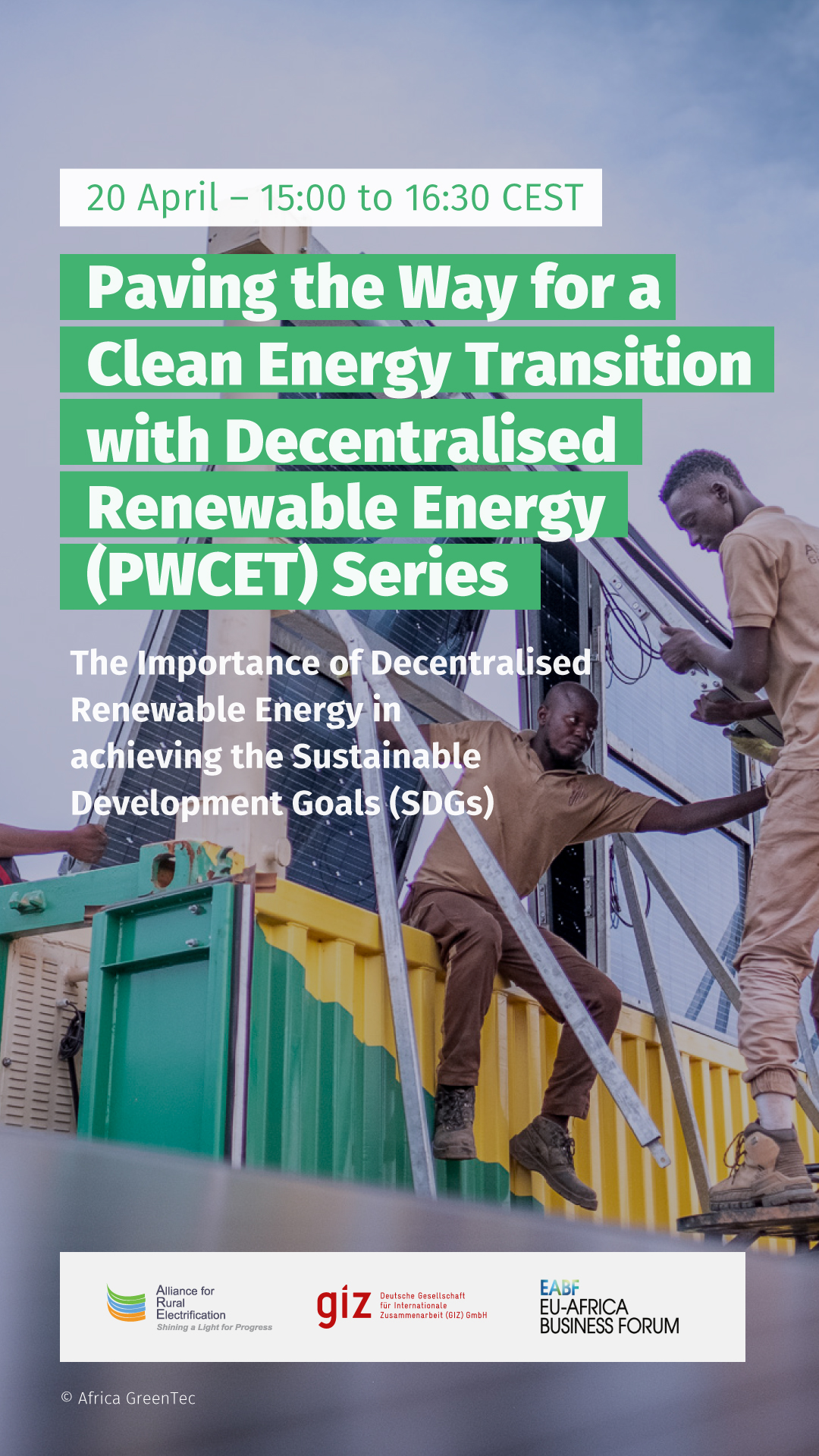
The new joint initiative by ARE and GBE entitled ‘Paving the way for Clean Energy Transition with Decentralised Renewable Energy (PWCET) Series’ was organised during the Digital Marketplace for Green Energy Transition day at the EU – Africa Business Forum (EABF) on 20 April 2021, attracting the participation of more than 200 people from EU, Africa and beyond.
The launch event of the PWCET Series managed to bring together key stakeholders to discuss DRE systems to respond to increased energy demand in Sub-Saharan Africa and power the green recovery after the pandemic, both of which are critical elements of the clean energy transition.
[Presentation] [Recording] [Event Summary]
Event 2
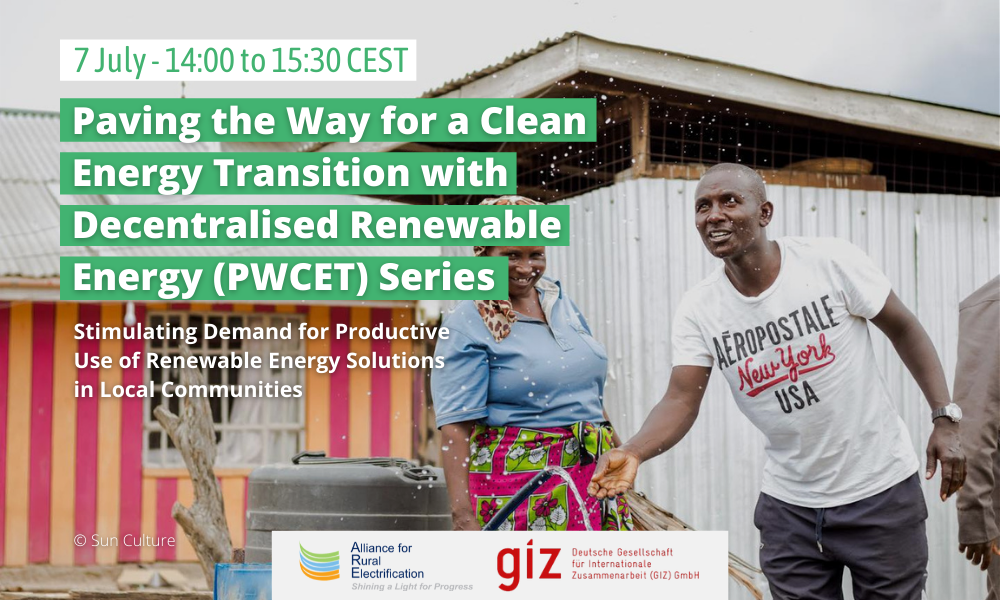
The second webinar on “Stimulating Demand for Productive Use of Renewable Energy Solutions in Local Communities” was organised on 7 July 2021 as part of the PWCET Series.
DRE solutions have the potential to drive green, sustainable and inclusive rural transformation, reduce poverty and improve the livelihoods and climate resilience of rural populations as they provide access to affordable, reliable and clean energy. Productive Use of Renewable Energy (PURE) can be a significant driver of economic growth and social progress in developing countries.
The webinar delved into what it takes to stimulate demand for and an uptake of PURE solutions in rural communities and will under a holistic approach address the different aspects of the PURE ecosystem. The speakers highlighted the challenges and barriers, presented examples of innovative solutions, business models and emphasised the opportunities of productive use activities to improve the livelihoods of rural communities.
[Presentation] [Recording] [Event Summary]
Event 3
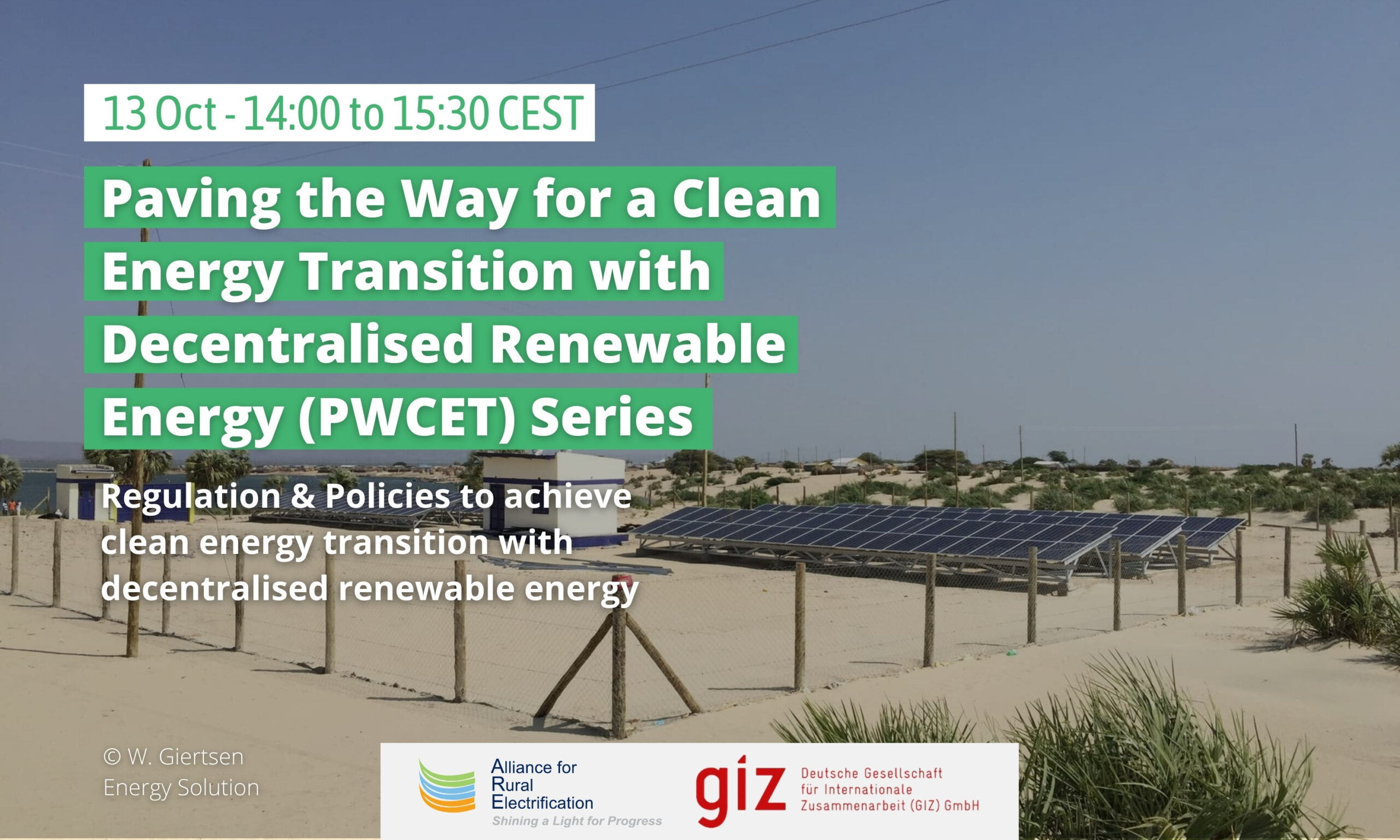
The third webinar on “Regulation & Policies to Achieve a Clean Energy Transition with Decentralised Renewable Energy“ was organised on 13 October 2021 as part of the PWCET Series.
Fuelled by DRE solutions, the energy sector is evolving rapidly and undergoing a disruptive transformation. This ongoing energy transition is a central building block to a secure, environmentally-friendly, and economically successful supply of universal access to modern energy services. It is crucial that their integration is timely to achieve other interlinked Sustainable Development Goals (SDGs) such as healthcare, livelihoods, water and education.
The webinar brought together experts from Germany, Ethiopia, Ghana, Namibia and Nigeria to discuss effective regulatory and policy development mechanisms and the shortcomings that are relevant for the wider rollout of DRE solutions to ensure a just and clean energy transition in their respective countries.
[Presentation] [Recording] [Event Summary]
Event 4
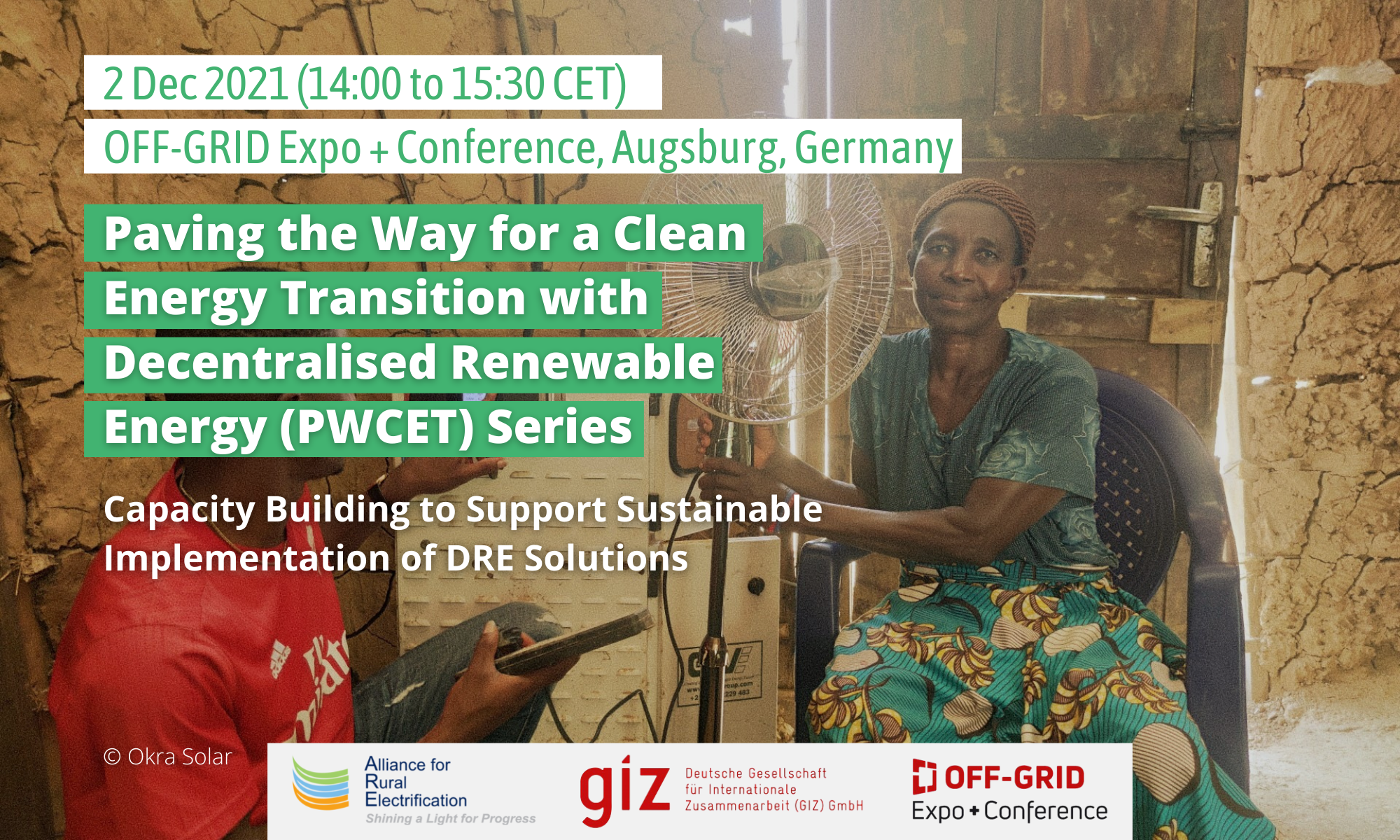
The fourth PWCET event titled ‘”Capacity Building to Support Sustainable Implementation of DRE Solutions” took place in a hybrid format at the OFF-GRID Expo + Conference in Augsburg on the 2 December 2021. This was the first time that participation could be both physical and virtual.
Electricity is an essential driver of development in rural and peri-urban communities, enabling essential services such as clean water, education and reliable health care services, and creates opportunities for developing income-generating activities. Yet, 870 million people currently lack access to safe, reliable and efficient electricity, while another 1.5 billion suffer from unreliable electricity services. As the DRE sector inevitably grows and the world moves towards universal electrification by 2030, it is of utmost importance that sustainability is embedded in all projects and that safety, efficiency and reliability become the cornerstone of rural electrification efforts. The solution to the sustainability challenge lies with the skills of the local workforce, which must be strengthened to deal with the monumental increase in decentralised electrification needs in the years to come.
The hybrid event engaged experts from the industry to outline the need for and importance of capacity building for the DRE sector and the achievement of all the Sustainable Development Goals, as well as to elaborate on experiences of DRE companies and stakeholders with capacity building in emerging markets.
[Presentation] [Recording] [Event Summary]
Event 5
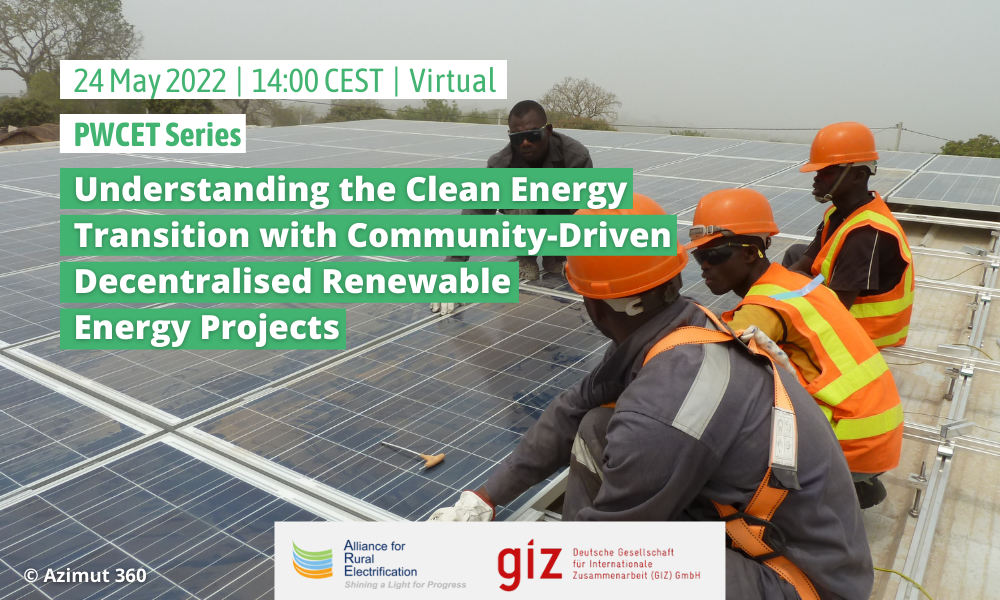
In its fifth event under the PWCET series, ARE and GBE organised the launch of their new publication titled “Understanding the Clean Energy Transition with Community-Driven Decentralised Renewable Energy Projects” on 24 May 2022.
Climate change impacts have accelerated and amplified over the last decades. Extreme weather, natural disasters, economic collapses, food and water insecurity, are all symptoms of this crisis. Similarly, 759 million people currently lack access to electricity, while another 2.8 billion still suffer from unreliable electricity services. With the goals of the Paris Agreement seemingly challenging to achieve by 2030, new approaches to the clean energy transition are required.
The session featured the keynote from the representative of GBE and a guest intervention by IRENA. Followed by that, four case study contributors from the publication presented their community DRE projects from different countries.
The discussion focused on the necessity and impact of community-driven or community-supported DRE projects to scale up clean energy penetration to countries’ energy mix and thereby achieve clean energy transition.
[Presentation] [Recording] [Event Summary]
Event 6
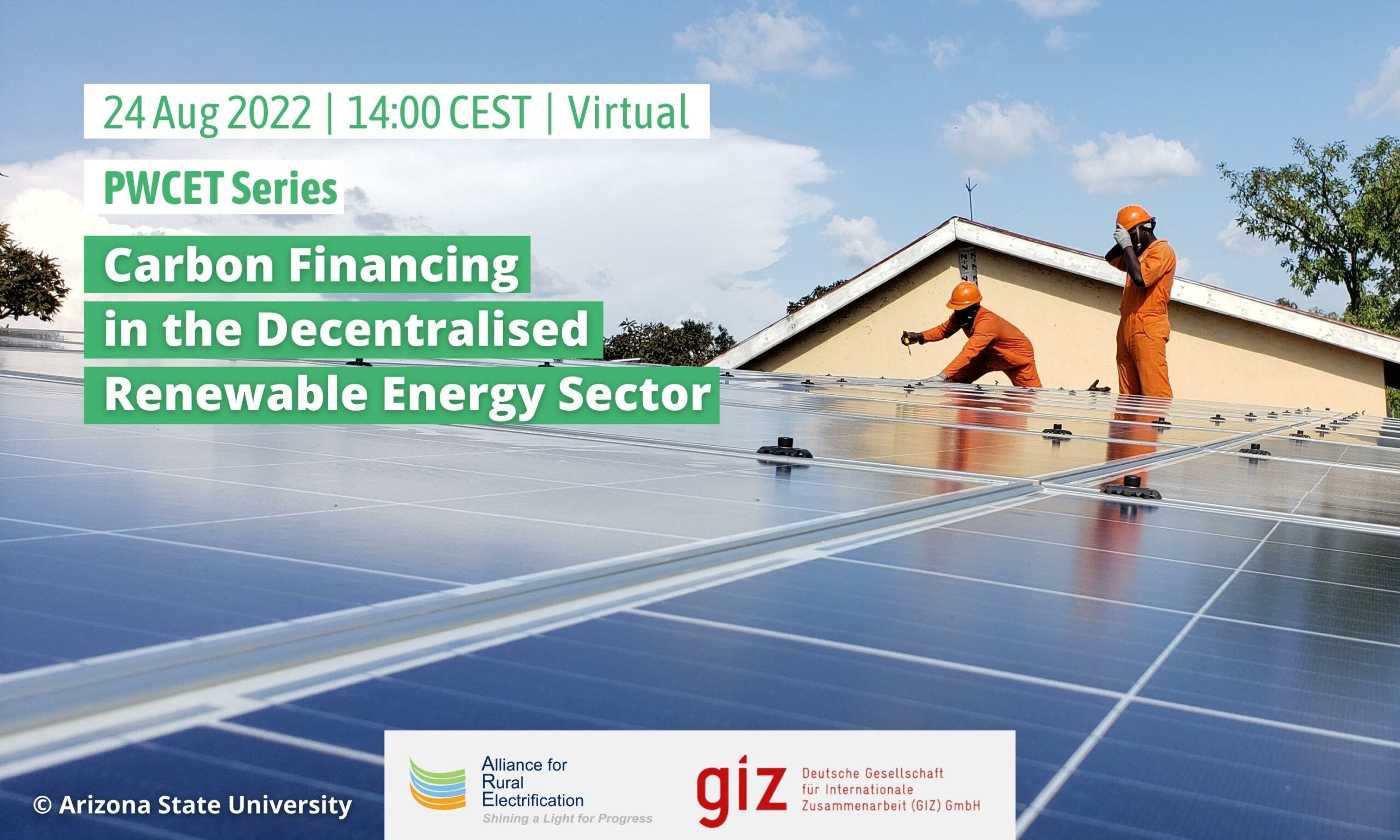
In its sixth event under the PWCET series, ARE and Green People’s Energy (GBE) organised a discussion on ‘Carbon Financing in the Decentralised Renewable Energy Sector’ on 24 August 2022 at 14:00 – 15:30 CEST.
With only 3% of climate finance directed toward decentralised renewable energy (DRE), the discussion focused on carbon financing as an innovative mechanism complimenting the conventional funding mechanisms to power DRE projects. The webinar explored the challenges faced by the private sector in securing funds for DRE projects and how carbon finance can be used to compliment the finance mix.
The experts and companies who had tapped into carbon financing to raise capital for their DRE projects gave their insights at this webinar. The interventions were followed by a moderated panel discussion including interaction with the audience.
[Presentation] [Recording] [Event Summary]
Event 7
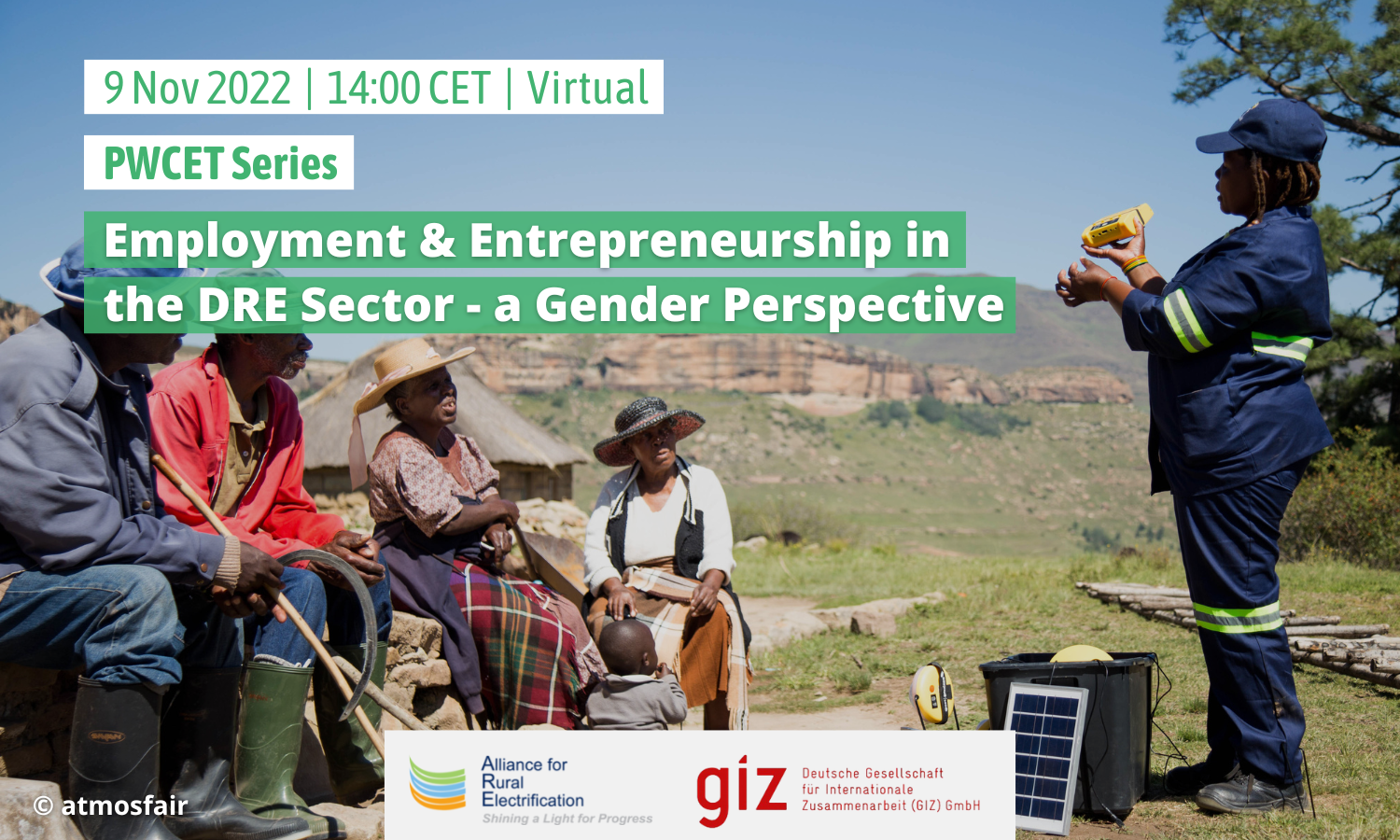
The 7th webinar under the PWCET series had experts from the industry and public sector discussing the opportunities and constraints that low-income women face in accessing livelihoods in each level of the DRE supply chain. The interventions will be followed by a panel discussion and audience interaction.
The global energy transition offers unparalleled employment opportunities. Recent evidence shows that DRE solutions have enabled unprecedented opportunities for women in rural communities. An estimated 30-37% of SMEs in emerging markets are owned and operated by women.
DRE solutions can boost rural business development and improve women’s incomes and decision-making power. Hence, rural women must be empowered to be active participants in the entire renewable energy value chain – as entrepreneurs, employees, innovators, designers, and decision-makers, contributing to the expansion of energy access.
[Presentation] [Recording] [Event Summary]
Event 8
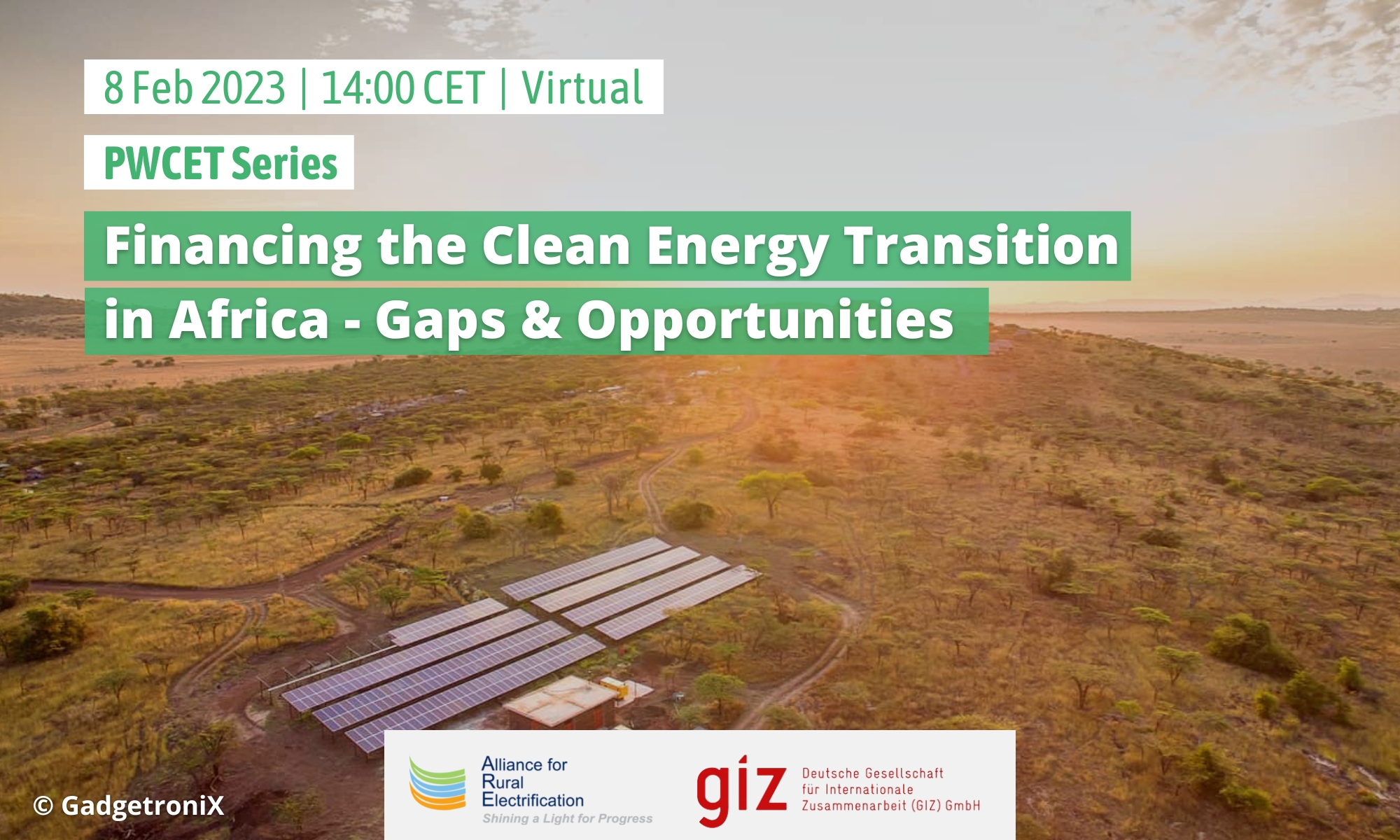
A clean energy transition potentially ensures vast socio-economic benefits to countries across Africa, especially in sub-Saharan Africa thereby improving access to affordable energy, providing employment opportunities locally and scaling up energy security. The major challenge towards realising these benefits is largely due to lack of flow of investments in the clean energy sector.
African countries have an opportunity to leapfrog fossil fuel technologies to a more sustainable, climate-friendly and efficient energy strategy which adheres to the Paris Agreement and low-carbon growth. Access to finance can enable a clean energy transition by facilitating socio-economic development in the rural as well as urban communities of Africa.
The 8th webinar under the PWCET series discussed the gaps and opportunities in the financing of the clean energy transition in Africa. The speakers’ interventions were followed by a moderated panel discussion including interaction with the audience.
[Presentation] [Recording] [Event Summary]
Event 9
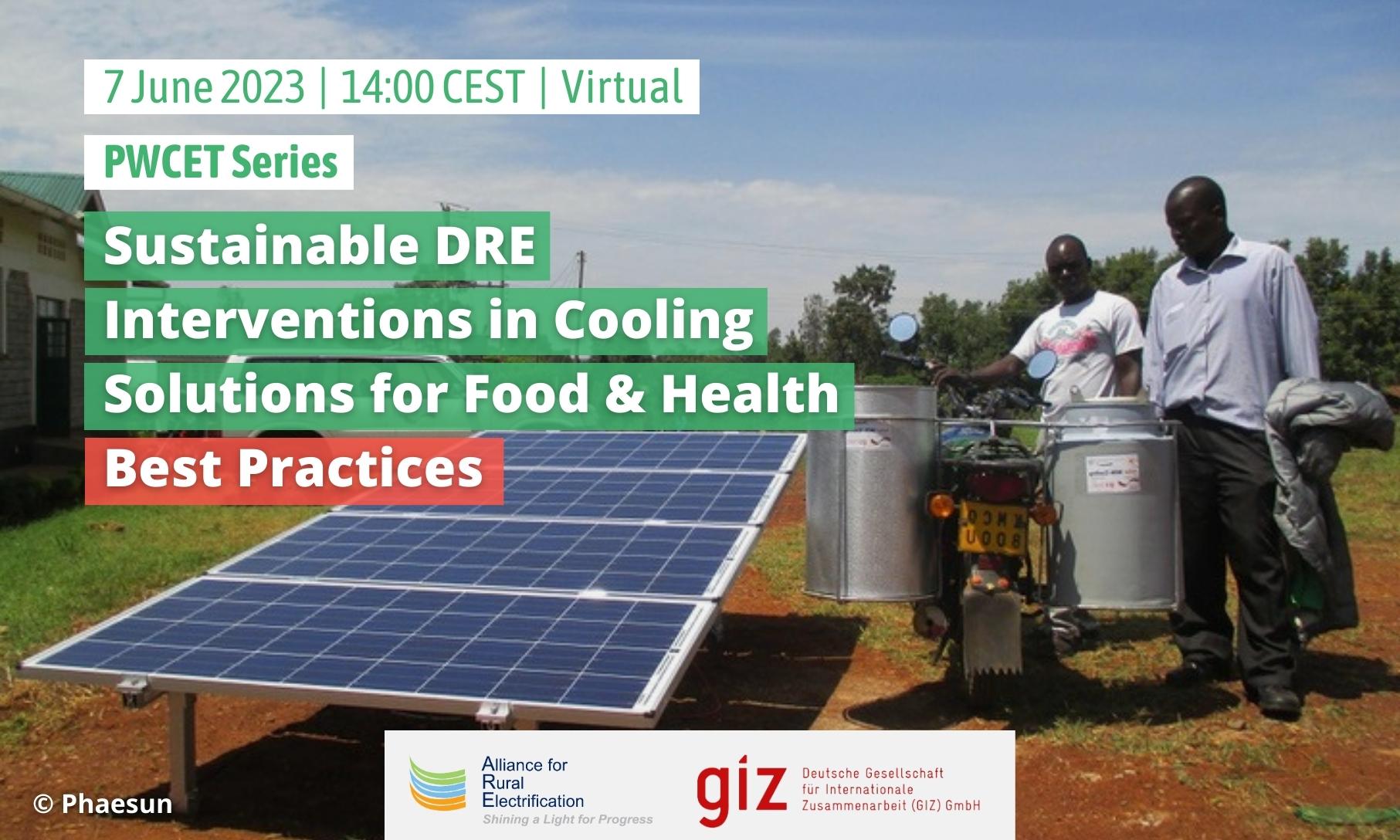
A clean energy transition potentially ensures vast socio-economic benefits to countries across Africa, especially in sub-Saharan Africa thereby improving access to affordable energy, unlocking income generation opportunities locally and scaling up energy security to enhance the socio-economic standards.
One of the major challenges to tackle is waste (produce, milk, etc.) generated by the food and agri sectors due to lack of access to cold storage facilities. Farmers lose their livelihood after harvesting simply because they could not get the products sold in due time. A parallel topic to address here is also in the health sector where vaccines, medicines, blood products and other essential items that perish due to the unavailability of appropriate cooling storage facilities.
Introduction of sustainable cooling innovations driven by decentralised renewable energies (DRE) can be instrumental in dealing with the above-mentioned issues. African countries have an opportunity to replace fossil fuel technologies to a more sustainable, climate-friendly, and efficient energy strategy which adheres to the Paris Agreement and low-carbon growth. Access to such novel innovations can enable a clean energy transition by enabling development in the rural as well as urban communities of Africa.
The 9th webinar under the PWCET series discussed how the introduction of sustainable cooling innovations driven by DRE can be instrumental and highlighted the best practices from the sector. The speakers’ interventions were followed by a moderated panel discussion including interaction with the audience.
[Presentation] [Recording] [Event Summary]
Event 10
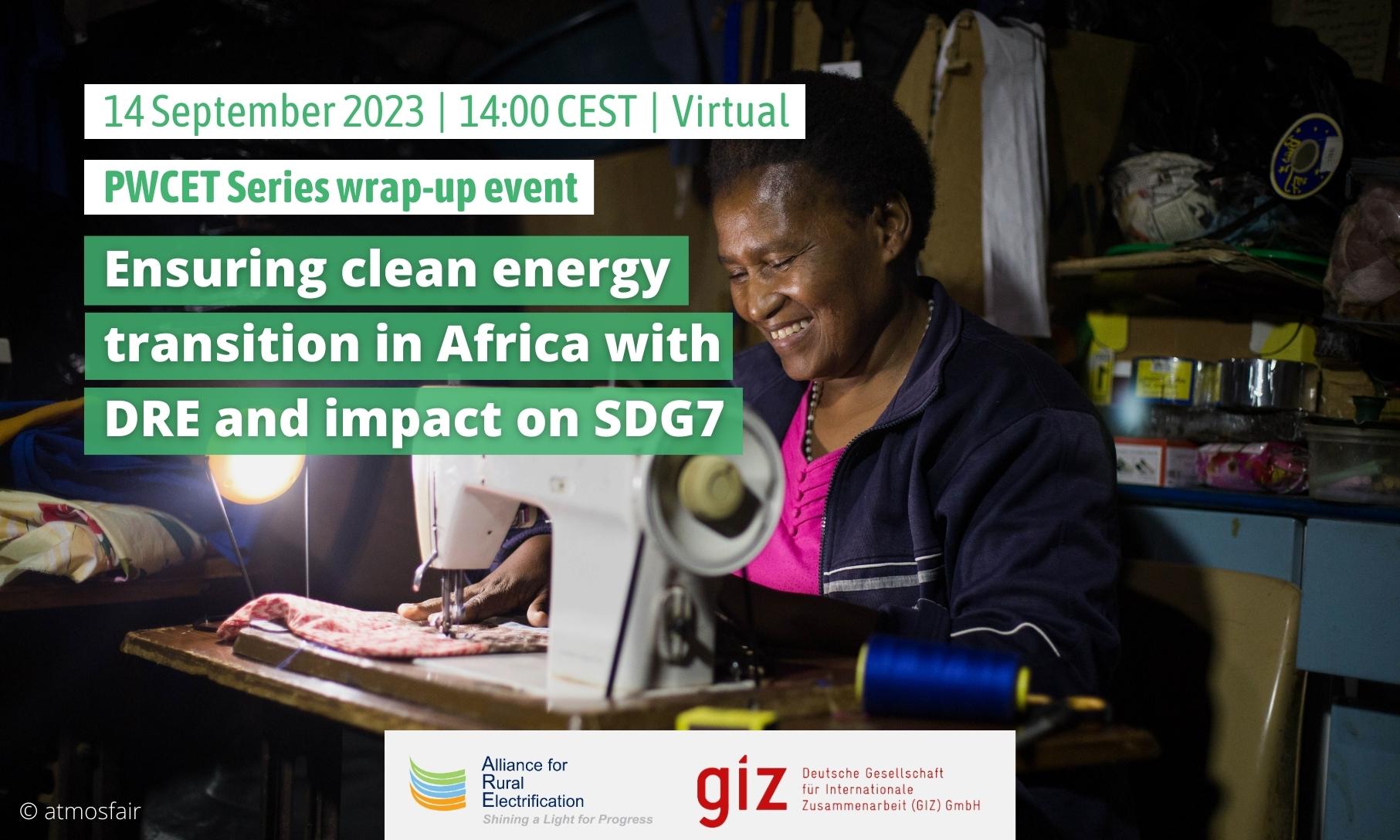
Energy is the prime mover of all the sectors. Since 2000, global energy consumption has increased by about a third and is projected to continue to grow in the foreseeable future. 83% of the energy we use comes from fossil fuels. Oil is the biggest energy source followed by coal and natural gas. This makes green energy innovation essential. A just and clean energy transition potentially ensures vast socio-economic benefits to countries across Africa, especially in sub-Saharan Africa thereby improving access to affordable energy, unlocking income generation opportunities locally and scaling up energy security to enhance the socio-economic standards.
DRE as a solution has been at the forefront of this PWCET series whereby ARE and GBE strongly advocate for the application and implementation of DRE technologies in order to bring access to power as well as enhance the existing grid in sub-Saharan Africa. This ambition is on track to achieve a clean energy transition with a community-centric approach where the local citizens take interest and part in their energy demand and supply infrastructures.
For the final webinar of their renowned PWCET series, ARE and GBE engaged the DRE sector experts to discuss the status of SDG 7 today and how it is contributing to the overall energy transition, particularly in sub-Saharan Africa.
[Presentation] [Recording] [Event Summary]
